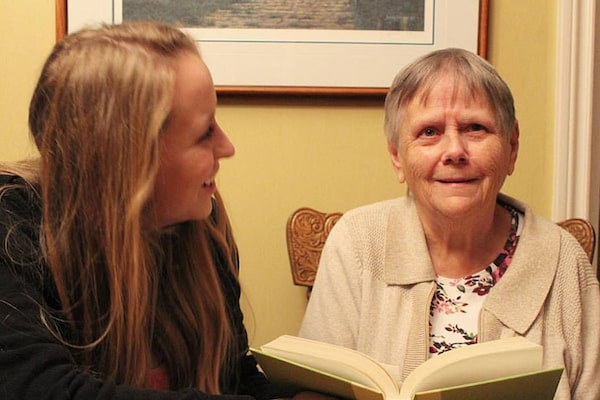When Marilyn Thompson stopped toting around her tattered leather Bible and the dog-eared romance novels no longer appeared on her night table, at first her family thought the 73-year-old with dementia had lost her capacity to read.
Then one day over toast and coffee with the local newspaper spread across the breakfast table at Ms. Thompson’s Hamilton home, she surprised her husband Raymond and her granddaughter Rachel Thompson.
“She started reading a headline out loud word for word, perfectly,” Rachel Thompson said. “At this point, she didn’t even know my name or her husband’s name, but she was able to read these complex words. I was astounded that she proved me wrong and that she could still actually read.”

Rachel Thompson, left, with her grandmother Marilyn Thompson. Rachel has founded Marlena Books which produces hard-cover books for people with dementia.
Excited that her grandmother could still read and knowing what a big part of her life it used to be, Ms. Thompson went online to look for fiction aimed at people with dementia.

The Heart Garden, a dementia-friendly novel published by Marlena Books. The books are written at about a Grade 5 reading level, but the content is for adults.
The fourth-year health-sciences student at the University of Waterloo didn’t find what she was looking for, but she was inspired nonetheless. The first book Ms. Thompson published in 2015 was for her grandmother; a romance called A Love That Waited. Three years later, Waterloo, Ont.,-based Marlena Books, Ms. Thompson’s line of hardcover dementia-friendly books (which are at about a Grade 5 reading level, but for adults) generates $10,000 a month in sales, employs four full-time staffers and is about to launch an app that will host books on Oct. 24.
“It’s organically grown through our ability to resonate with people who are also having similar experiences as my family,” said Ms. Thompson about the five books out now. An additional 10 are being released in November.
As the population ages, a number of apps aimed at improving the lives of people living with dementia or Alzheimer’s are now available. According to the Alzheimer’s Society of Canada, 500,000 Canadians are living with the conditions and within the next generation, this is expected to double to 1.1-million people.

Mary Pat Hinton was inspired by her grandmother’s lonely journey with dementia when she created the subscription-based app MemorySparx. 'It’s software that’s easy for people with impairments to use.'
Like Ms. Thompson, Mary Pat Hinton was also inspired by her grandmother’s lonely journey with dementia when she created the subscription-based app MemorySparx, a daily life-event diary that helps people record and recall important details about their day, life and health.
“[It] provides a cheat-sheet of sorts, which helps users feel more confident in social settings, but also allows people to prepare just before a conversation,” said Ms. Hinton, a former BlackBerry executive, and co-founder of Emmetros, a Waterloo-based software company that helps people with cognitive impairments live independently and with dignity. “Our differentiator is on the design side: it’s software that’s easy for people with impairments to use.”
The app costs $14.99 and has several hundred downloads, Ms. Hinton said. The next incarnation called MemorySparx Connect ($39.99 for the subscription-based app) launches in December, and includes the capacity to link others in the care circle.
Ms. Hinton said the app can help avoid “responsive behaviours” such as when people are upset because they don’t feel heard or understood. As staff don’t have many options in their toolkit, perhaps they resort first to medication or restraint, she added. The app allows everyone in a patient’s inner care circle – from their hair stylist, to homecare worker and family doctor – to write notes and read the app, which is like a patient’s own personal database.
Another downloadable tool recently launched by Halifax-based DGI Clinical is the free app, Dementia SymptomGuide which launched this past July. It’s intended for use by caregivers for persons affected with dementia and Alzheimer’s disease to learn, track and communicate symptoms. The caregiver or patient selects several symptoms from a menu of 80 which they find are the most important or bothersome to them. The symptoms are tracked over time to see whether the symptoms have improved or deteriorated.

Chère Chapman, CEO of DGI Clinical in Halifax which has launched a free app called the Dementia SymptomGuide. 'The app will inform the clinician about not what’s the matter with you, but what matters to you with your own health care.'Ryan Tobin
“You can share that information with people that you love so they can better understand what’s happening with mom or with dad,” said DGI Clinical CEO Chère Chapman.
“The app will inform the clinician about not what’s the matter with you, but what matters to you with your own health care.”
So far hundreds have downloaded the app in North America and Scotland after hearing about it through word of mouth and a homegrown social media approach to marketing, but Ms. Chapman is hoping for more.
“From a social impact point of view, the more users we can get using this kind of thing, the more we can learn about Alzheimer’s disease and dementia. Our absolute ambition would be for this to go viral globally,” she said.
DGI makes money by designing tools like this for pharmaceutical companies’ clinical trials, and Ms. Chapman said the app could eventually become a revenue generator and benefit Alzheimer’s disease research by producing real world evidence direct from caregivers about the value of the therapies pharmaceutical companies provide.
The challenge, however, with many of these new tools is getting them into the hands of users.
Becky Reuber, professor of strategic management at Rotman School of Management at the University of Toronto, says getting the attention of caregivers of people with dementia and Alzheimer’s disease is difficult because they’re so busy.
She said some companies with health apps have gotten traction by going to medical residents, rather than targeting busy professionals who are already doctors.
“Because their habits aren’t set, they’re willing to try new things, they’re very computer literate and they like the efficiency of apps,” Dr. Reuber said.
Dr. Reuber also suggests enlisting a “super user,” rather than waiting for them to spread the word, perhaps by asking them to write a blog for your website. She defines a “super user” as someone who loves a product, relies on it, understands it and could become a brand ambassador.
“If I’m a super user of one of these apps and products and I’m a caregiver of someone with Alzheimer’s, chances are I know other people too.”